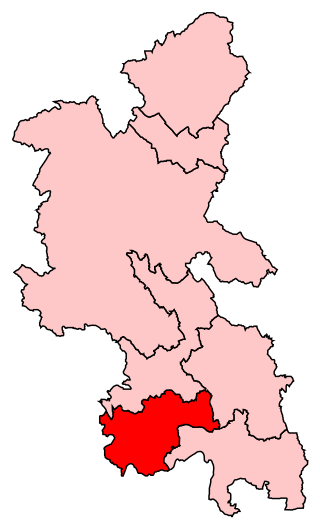
Aylesbury is a constituency represented in the House of Commons of the UK Parliament since 2019 by Rob Butler of the Conservative Party.

Wycombe is a constituency in Buckinghamshire represented in the House of Commons of the UK Parliament since 2010 by Steve Baker, a Conservative.
Oxford was a parliamentary constituency in the United Kingdom, comprising the city of Oxford in the county of Oxfordshire.

Lancaster was a constituency of the House of Commons of the Parliament of England then of the Parliament of Great Britain from 1707 to 1800 and of the Parliament of the United Kingdom from 1801 to 1867, centred on the historic city of Lancaster in north-west England. It was represented by two Members of Parliament until the constituency was disenfranchised for corruption in 1867.
Buckinghamshire is a former United Kingdom Parliamentary constituency. It was a constituency of the House of Commons of the Parliament of England then of the Parliament of Great Britain from 1707 to 1800 and of the Parliament of the United Kingdom from 1801 to 1885.
Wendover was a borough constituency of the House of Commons of the Parliament of England then of the Parliament of Great Britain from 1707 to 1800 and of the Parliament of the United Kingdom from 1801 to 1832. It was based on the borough of Wendover, was represented by two Members of Parliament, and was considered a classic example of a pocket borough.
Derby is a former United Kingdom Parliamentary constituency. It was a constituency of the House of Commons of the Parliament of England, then of the Parliament of Great Britain from 1707 to 1800 and of the Parliament of the United Kingdom from 1801 to 1950. It was represented by two members of parliament. It was divided into the single-member constituencies of Derby North and Derby South in 1950.

Clitheroe was a parliamentary constituency in Lancashire.
Amersham, often spelt as Agmondesham, was a constituency of the House of Commons of England until 1707, then in the House of Commons of Great Britain from 1707 to 1800 and finally in the House of Commons of the United Kingdom from 1801 to 1832. It was represented by two Members of Parliament (MPs), elected by the bloc-vote system.
Hertford was the name of a parliamentary constituency in Hertfordshire, which elected Members of Parliament (MPs) from 1298 until 1974.
Weymouth and Melcombe Regis was a parliamentary borough in Dorset represented in the English House of Commons, later in that of Great Britain, and finally in the Parliament of the United Kingdom. It was formed by an Act of Parliament of 1570 which amalgamated the existing boroughs of Weymouth and Melcombe Regis. Until 1832, the combined borough continued to elect the four Members of Parliament (MPs) to which its constituent parts had previously been entitled; the Great Reform Act reduced its representation to two Members, and the constituency was abolished altogether in 1885, becoming part of the new South Dorset constituency.
Helston, sometimes known as Helleston, was a parliamentary borough centred on the small town of Helston in Cornwall.
Southampton was a parliamentary constituency which was represented in the British House of Commons. Centred on the town of Southampton, it returned two members of parliament (MPs) from 1295 until it was abolished for the 1950 general election.
Cricklade was a parliamentary constituency named after the town of Cricklade in Wiltshire.
Norwich was a borough constituency in Norfolk which was represented in the House of Commons of England from 1298 to 1707, in the House of Commons of Great Britain from 1707 to 1800, and in the House of Commons of the United Kingdom from 1801 until it was abolished for the 1950 general election. Consisting of the city of Norwich in Norfolk, it returned two members of parliament (MPs), elected by the bloc vote system.

Marylebone was a parliamentary constituency in Middlesex, England from 1832 to 1885. The parliamentary borough formed part of the built up area of London, and returned two members to the House of Commons of the UK Parliament and was created under the Reform Act 1832. It was abolished by the Redistribution of Seats Act, 1885 which split it into 8 seats.
Monmouth Boroughs was a parliamentary constituency consisting of several towns in Monmouthshire. It returned one Member of Parliament (MP) to the House of Commons of the Parliaments of England, Great Britain, and finally the United Kingdom; until 1832 the constituency was known simply as Monmouth, though it included other "contributory boroughs".
Andover was the name of a constituency of the House of Commons of the Parliament of England from 1295 to 1307, and again from 1586, then of the Parliament of Great Britain from 1707 to 1800 and of the Parliament of the United Kingdom from 1801 to 1918. It was a parliamentary borough in Hampshire, represented by two Members of Parliament until 1868, and by one member from 1868 to 1885. The name was then transferred to a county constituency electing one MP from 1885 until 1918.
Lyme Regis was a parliamentary borough in Dorset, which elected two Members of Parliament (MPs) to the House of Commons from 1295 until 1832, and then one member from 1832 until 1868, when the borough was abolished.
Sandwich was a parliamentary constituency in Kent, which elected two Members of Parliament (MPs) to the House of Commons from 1366 until 1885, when it was disfranchised for corruption.





